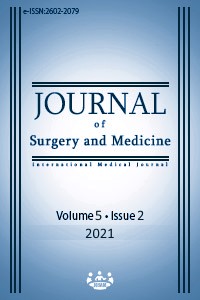Experience of chronic thromboembolic pulmonary hypertension (CTEPH) in two cases with scleroderma and immunopathogenesis overview: Case report
Keywords:
Scleroderma, Pulmonary Hypertension, CTEPHAbstract
Systemic Sclerosis (SSc) is a multi-systemic connective tissue disease of unknown etiology. Although many pathological processes play a role in the basis of pulmonary hypertension (PHT) that develops secondary to SSc, vasculopathy has an important place. Chronic thromboembolic hypertension (CTEPH) is in the group 4 PHT class. CTEPH distinguishes it from other causes of PHT by having both surgical and medical treatment options. CTEPH is a pathology that develops chronically and can be overlooked due to its nonspecific symptoms. Early diagnosis and treatment can reduce morbidity and mortality. The physiopathology of vasculopathy secondary to CTEPH and vasculopathy of SSc made us suspect that similar processes operate in both diseases. The processes that cause and follow endothelial damage are similar in both diseases. If this pathophysiological mechanism can be clarified, possible new treatment options can be discovered. We diagnosed CTEPH with the examinations we performed in two of our patients with SSc and interstitial lung disease, both of which developed PHT. We aimed to discuss the immunopathogenesis with two case reports.
Downloads
References
Allanore Y, Simms R, Distler O, Trojanowska M, Pope J, Denton CP, Varga J. Systemic sclerosis. Nature Reviews Disease Primers. 2015;15002. doi:10.1038/nrdp.2015.2
Jamieson SW, Kapelanski DP, Sakakibara N, Manecke GR, Thistlethwaite PA, Kerr KM, et al. Pulmonary endarterectomy: experience and lessons learned in 1,500 cases. Ann Thorac Surg. 2003;76:1457-62.
Galie N, Humbert M, Vachiery JL, et al. 2015 ESC/ERS Guidelines for the diagnosis and treatment of pulmonary hypertension: The Joint Task Force for the Diagnosis and Treatment of Pulmonary Hypertension of the European Society of Cardiology (ESC) and the European Respiratory Society (ERS): Endorsed by: Association for European Paediatric and Congenital Cardiology (AEPC), International Society for Heart and Lung Transplantation (ISHLT). Eur Heart J. 2016;37:67–119.
Condliffe R, Kiely DG, Gibbs JS, et al. Improved outcomes in medically and surgically treated chronic thromboembolic pulmonary hypertension. Am J Respir Crit Care Med. 2008;177:1122–7.
Mackel AM, DeLustro F, Harper FE, LeRoy EC. Antibodies to collagen in scleroderma. Arthritis Rheum. 1982;25:522-31.
Khaleh MB, LeRoy EC. Interleukin-2 in scleroderma:correlation of serum level with extent of skin involvement and dissease duration Ann Intern Med. 1989;110:446-50.
Silver RM. Lymphokine activated killer (LAK) cell activity in the peripheral blood of lymphosites of systemic sclerosis patients. Clin Exp Rhematology. 1990;8:481-6.
Rodnan GP, Myrewitz RL, Justh GO. Morphologicchanges in the digital arteries of patients with progresive systemic sclerosis and Raynaud phenomenon. Medicine. 1980;59:393-408.
Madge LA, Li JH, Choi J, Pober JS. Inhibition of phosphatidylinositol 3-kinase sensitizes vascular endothelial cells to cytokine-initiated cathepsin-dependent apoptosis. J Biol Chem. 2003;278(23):21295-306.
Hussein MR, Hassan HI, Hofny ER, et al. Alterations of mononuclear inflamatory cells, CD4/CD8+ T cells, interleukin 1beta, and tumour necrosis factor alpha in the bronchoalveolar lavage fluid, peripheral blood, and skin of patients with systemic sclerosis. J Clin Pathol. 2005;58(2):178-84.
Wusirika R, Ferri C, Marin M, et al. The assessment of anti-endothelial cell antibodies in scleroderma-associated pulmonary fibrosis. A study of indirect immunofluorescent and western blot analysis in 49 patients with scleroderma. Am J Clin Pathol. 2003;120(4):596-606.
Krogsgaard M, Davis MM. How T cell'see'antigen. Nat Immunol. 2005;6(3):239-45.
Zamora MR, O'Brien RF, Rutherford RB, Weil JV. Serum endothelin-1 concentrations and cold provocation in primary Raynaud's phenomenon. Lancet. 1990;336:1144.
Vancheeswaran R, Magoulas T, Efrat G, et al. Circulating endothelin-1 levels in systemic sclerosis subsets--a marker of fibrosis or vascular dysfunction? J Rheumatol. 1994;21:1838.
Debendra Pattanaik, Monica Brown, Bradley C. Postlethwaite, and Arnold E. Pathogenesis of Systemic Sclerosis. Postlethwaite. Front Immunol. 2015;6:272. doi: 10.3389/fimmu.2015.00272
Zhang M, Zhang Y, Pang W, Zhai Z, Wang C. Circulating biomarkers in chronic thromboembolic pulmonary hypertension. Pulm Circ. 2019 Apr-Jun;9(2):2045894019844480. doi: 10.1177/2045894019844480
Moser KM, Auger WR, Fedullo PF. Chronic major-vessel thromboembolic pulmonary hypertension. Circulation. 1990;81:1735-43.
Condliffe R, Kiely DG, Gibbs JS, Corris PA, Peacock AJ, Jenkins DP, et al. Prognostic and aetiological factors in chronic thromboembolic pulmonary hypertension. Eur Respir J. 2009;33:332-8. 3.
Pepke-Zaba J, Delcroix M, Lang I, Mayer E, Jansa P, Ambroz D, et al. Chronic thromboembolic pulmonary hypertension (CTEPH): results from an international prospective registry. Circulation. 2011;124:1973-81.
Skoro-Sajer N, Marta G, Gerges C, Hlavin G, Nierlich P, Taghavi S, Sadushi-Kolici R, Klepetko W, Lang IM. Surgical specimens, haemodynamics and long-term outcomes after pulmonary endarterectomy. Thorax. 2014;69(2):116–22.
Bernard J, Yi ES. Pulmonary thromboendarterectomy: a clinicopatho- logic study of 200 consecutive pulmonary thromboendarterectomy cases in one institution. Hum Pathol. 2007;38(6):871–7.
Matthews DT, Hemnes AR. Current concepts in the pathogenesis of chronic thromboembolic pulmonary hypertension. Pulm Circ. 2016 Jun;6(2):145-54.doi: 10.1086/686011.
Quarck R, Wynants M, Verbeken E, Meyns B, Delcroix M. Contribution of inflammation and impaired angiogenesis to the pathobiology of chronic thromboembolic pulmonary hypertension. Eur Respir J. 2015;46(2):431–43.
Kato F, Tanabe N, Ishida K, et al. Coagulation-fibrinolysis system and postoperative outcomes of patients with chronic thromboembolic pulmonary hypertension. Circ J. 2016;80:970–9.
Yang M, Deng C, Wu D, et al. The role of mononuclear cell tissue factor and inflammatory cytokines in patients with chronic thromboembolic pulmonary hypertension. J Thromb. 2016; 42:38–45.
Rozenn Quarck, Marijke Wynants, Erik Verbeken, et al. Contribution of inflammation and impaired angiogenesis to the pathobiology of chronic thromboembolic pulmonary hypertension. Eur Respir J. 2015;46:431–43.
Soon E, Holmes AM, Barker L, et al. Inflammatory cytokines are elevated In patients with operable chronic thromboembolic pulmonary hypertension and predict outcome post-endarterectomy. Thorax. 2010;65(Suppl 4):A45.
Langer F, Schramm R, Bauer M, et al. Cytokine response to pulmonary thromboendarterectomy. Chest. 2004;126:135–41.
Zabini D, Heinemann A, Foris V, et al. Comprehensive analysis of inflammatory markers in chronic thromboembolic pulmonary hypertension patients. Eur Respir J. 2014; 44: 951–962.
Langer F, Bauer M, Tscholl D, et al. Circulating big endothelin-1: an active role in pulmonary thromboendarterectomy? J Thoracic Cardiovasc Surg. 2005;130:1342–7.
Downloads
- 615 849
Published
Issue
Section
How to Cite
License
Copyright (c) 2021 Burak Okyar, Fatih Albayrak, Bekir Torun, Nurhan Atilla, Betül Kızıldağ, Fatih Yıldız, Gözde Yıldırım Çetin
This work is licensed under a Creative Commons Attribution-NonCommercial-NoDerivatives 4.0 International License.
















